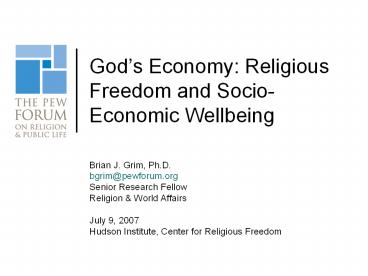Gods Economy: Religious Freedom and SocioEconomic Wellbeing - PowerPoint PPT Presentation
1 / 30
Title:
Gods Economy: Religious Freedom and SocioEconomic Wellbeing
Description:
'Is it very important to live in a country where there is religious freedom ... Religious freedom can remove sources of grievances that lead to conflict ... – PowerPoint PPT presentation
Number of Views:121
Avg rating:3.0/5.0
Title: Gods Economy: Religious Freedom and SocioEconomic Wellbeing
1
Gods Economy Religious Freedom and
Socio-Economic Wellbeing
- Brian J. Grim, Ph.D.
- bgrim_at_pewforum.org
- Senior Research Fellow
- Religion World Affairs
- July 9, 2007
- Hudson Institute, Center for Religious Freedom
2
Do you believe in God?
- A total of more than 90,000 people in eighty-four
countries answered this question when surveyed in
1982 and 2002 - World Values Surveys occurred between 1981-84,
and 2000-2002
3
Do you believe in God?
4
Do you believe in God?
5
Do you believe in God?
5-point gap indicates increased importance of
religious freedom
?
6
Is it very important to live in a country where
there is religious freedom ... ... for
you? ... for other religions?
- These two questions were asked to more than 7,400
people surveyed in 2006 in eleven countries (Pew
Forum)
7
Is religious freedom very important?
8
Is religious freedom very important?
9
Is religious freedom very important?
14-point gap indicates social restriction of
religious freedom
?
10
Measuring the dimensions of restricted Religious
Freedom
- Social regulation of religion index (SRI)
- Government regulation of religion index (GRI)
- Government favoritism of religion index (GFI)
- Overall restriction of religious freedom (RF)
11
Social Regulation of Religion
- 1) Social restrictions placed on the practice,
profession, or selection of religion by other
religious groups, associations, or the culture at
large.
12
Social Regulation Index (SRI)
- Negative attitudes to other religions
- Negative attitudes toward conversions
- Negative attitudes toward proselytizing
- Existing religions shut out new religions
- Social movements oppose certain religions
13
Government Regulation
- 2) Government restrictions placed on the
practice, profession, or selection of religion by
the official laws, policies, or administrative
actions of the state.
14
Government Regulation Index (GRI)
- Missionary work is prohibited
- Proselytizing or conversion is restricted
- Interference with an individuals right to
worship - No legal protection for religious freedom
- Government does not generally respect religious
freedom - Government policy does not contribute to
religious freedom
15
Government Favoritism
- 3) Government favoritism, or positive
sanctions, to one or more religious groups,
increasing freedom for some at the expense of
freedom for all.
16
Government Favoritism Index (GFI)
- state or established religion
- imbalanced government funding or subsidy of
religion - funding of religious
- - education
- - buildings
- - clergy
- - media
- - work (charities, practices, missions)
17
Overall Restrictions
- 4) Overall constraints on the free practice,
profession or selection of religion.
18
Restricted Religious Freedom (RF)
- The RF takes into account a broad and
multidimensional set of issues, including
- number of restrictions on religious freedom,
- gravity of those restrictions, and
- severity of penalties for transgressing them.
19
Significant Correlations (1.00 1-to-1
association not significant)
20
Correlation with conflict
21
Beside correlation with other restricted freedoms
conflict, what other relationships exist?
22
Correlations with gender issues
23
Correlation with economic issues
24
Correlation with health issues
25
The strongest conflict correlation
- Religious persecution is the physical abuse or
physical displacement due to ones religious
practices, profession, or affiliation. - See Grim Finke (this August, 2007) American
Sociological Review
26
Beyond a correlation?
- Correlation ? Causation
- Hypothesis tested Religious persecution results
from and reinforces social and government
regulation of religion
27
Results, controlling for alternatives (Grim
Finke 2007)
28
Socio-economic mechanisms related to religious
freedom
- Freedoms are a bundled commodity (A. Sen)
- Religious freedom can remove sources of
grievances that lead to conflict - Religious freedom can increases socio-economic
options for men and women by energizing civil
society and increasing sources of social capital - Religious freedom can allow religious groups to
address social health needs of the poor
29
Conclusion
- The data indicate that the issue of restricted
religious freedom is more than just a western or
American pet peeve - that is, the empirical evidence suggests that a
regulated and restrictive religious economy
does not benefit all of Gods growing number of
children.
30
Related Papers Articles
- Grim, B.J. and R. Wike. September, 2007. Does
the U.S. State Department Understand World Public
Opinion on Religion? To be presented at the
annual meeting of the World Association of Public
Opinion Research, Berlin, Germany. - Grim, B.J. and R. Finke. August, 2007. "Religious
Persecution in Cross-National Context Clashing
Civilizations or Regulated Economies?" American
Sociological Review 72633-648. - . 2006. International Religion Indexes
Government Regulation, Government Favoritism, and
Social Regulation of Religion. Interdisciplinary
Journal of Research on Religion 2 (Article 1). - . 2005. Documenting Religion Worldwide
Decreasing the Data Deficit. IASSIST Quarterly
291116. - Grim, B.J. 2004a. "Cul-de-Sac Scales The
interplay between religious restriction and
favoritism." The Sociological Methodologist
12-4. - . 2004b. The Cities of God Versus the
Countries of Earth The Regulation of Religious
Freedom (RRF). Presented at the annual meeting
of the Association for Study of Religion,
Economics, and Culture, October 22, Kansas City,
KS.































